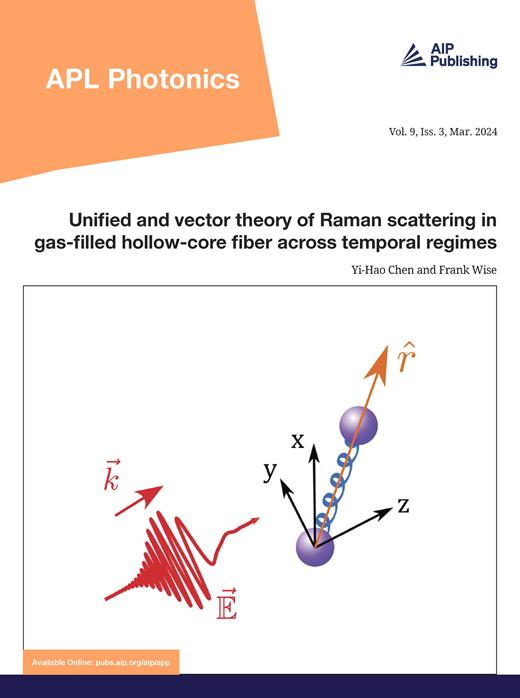A surface-normal photodetector as nonlinear activation function in diffractive optical neural networks
IF 5.4
1区 物理与天体物理
Q1 OPTICS
引用次数: 0
Abstract
Optical neural networks (ONNs) enable high speed, parallel, and energy efficient processing compared to their conventional digital electronic counterparts. However, realizing large scale ONN systems is an open problem. Among various integrated and non-integrated ONNs, free-space diffractive ONNs benefit from a large number of pixels of spatial light modulators to realize millions of neurons. However, a significant fraction of computation time and energy is consumed by the nonlinear activation function that is typically implemented using a camera sensor. Here, we propose a novel surface-normal photodetector (SNPD) with an optical-in–electrical-out (O–E) nonlinear response to replace the camera sensor that enables about three orders of magnitude faster (5.7 µs response time) and more energy efficient (less than 10 nW/pixel) response. Direct efficient vertical optical coupling, polarization insensitivity, inherent nonlinearity with no control electronics, low optical power requirements, and the possibility of implementing large scale arrays make the SNPD a promising O–E nonlinear activation function for diffractive ONNs. To show the applicability of the proposed neural nonlinearity, successful classification simulations of the MNIST and Fashion MNIST datasets using the measured response of SNPD with accuracy comparable to that of an ideal ReLU function are demonstrated.作为衍射光学神经网络非线性激活函数的表面法向光电探测器
与传统的数字电子网络相比,光学神经网络(ONNs)能够实现高速、并行和节能的处理。然而,实现大规模的ONN系统是一个悬而未决的问题。在各种集成和非集成的onn中,自由空间衍射onn得益于空间光调制器的大量像素来实现数百万神经元。然而,很大一部分计算时间和能量被非线性激活函数所消耗,而非线性激活函数通常使用相机传感器来实现。在这里,我们提出了一种新型的表面法向光电探测器(SNPD),具有光电输出(O-E)非线性响应,以取代相机传感器,使响应速度提高约三个数量级(5.7µs响应时间)和更节能(小于10 nW/像素)。直接有效的垂直光耦合、偏振不敏感、无控制电子器件的固有非线性、低光功率要求以及实现大规模阵列的可能性使SNPD成为衍射onn的有前途的O-E非线性激活函数。为了证明所提出的神经非线性的适用性,使用SNPD的测量响应对MNIST和Fashion MNIST数据集进行了成功的分类模拟,其精度与理想的ReLU函数相当。
本文章由计算机程序翻译,如有差异,请以英文原文为准。
求助全文
约1分钟内获得全文
求助全文
来源期刊

APL Photonics
Physics and Astronomy-Atomic and Molecular Physics, and Optics
CiteScore
10.30
自引率
3.60%
发文量
107
审稿时长
19 weeks
期刊介绍:
APL Photonics is the new dedicated home for open access multidisciplinary research from and for the photonics community. The journal publishes fundamental and applied results that significantly advance the knowledge in photonics across physics, chemistry, biology and materials science.
 求助内容:
求助内容: 应助结果提醒方式:
应助结果提醒方式:


